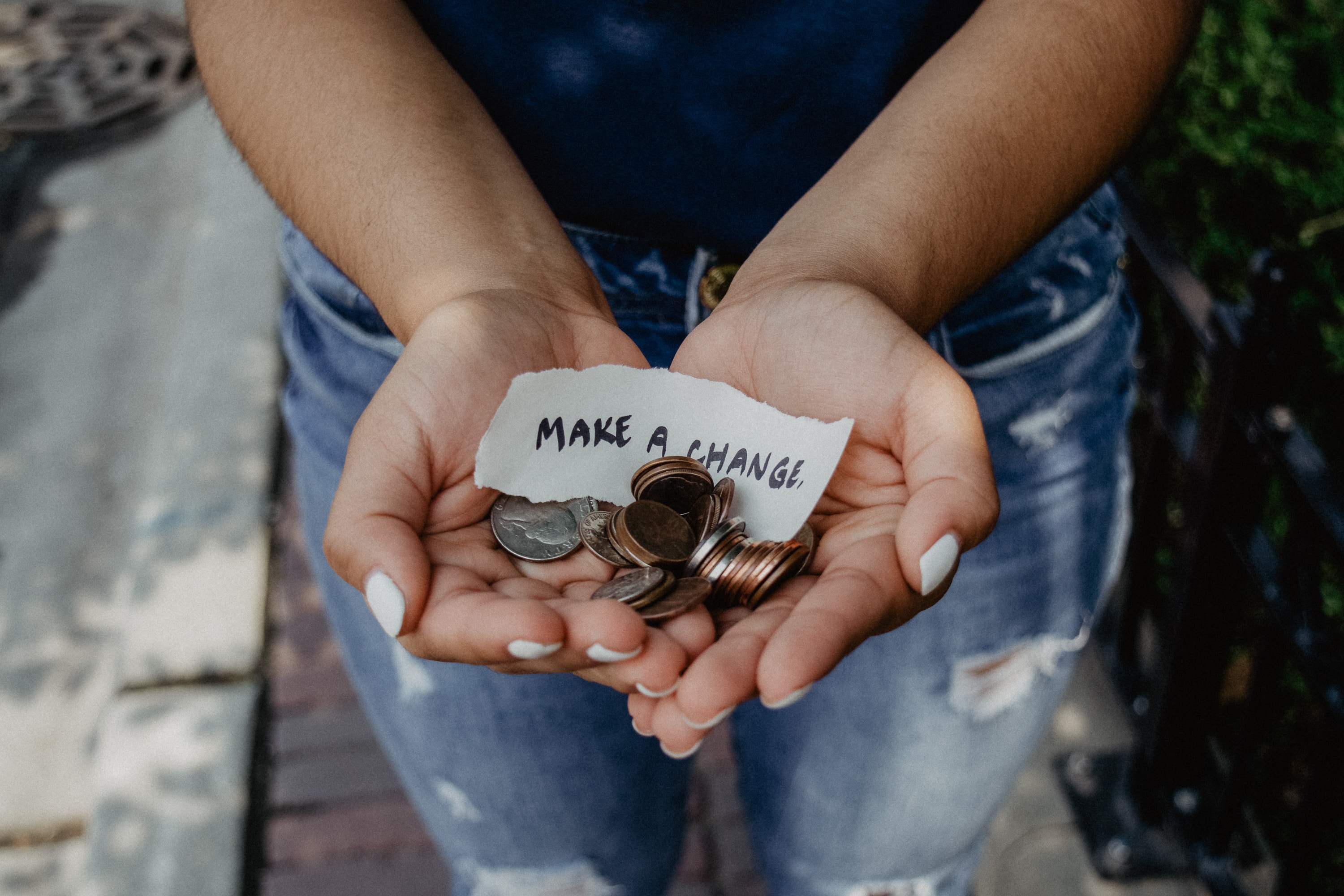This post is sponsored by Lexington Law.
Do you ever hear something that just makes your jaw drop? Because I cover so many financial topics here at GenTwenty, I’ve come across many shocking money stats that made me do just that.
Some of these things are a pleasant surprise (like #4) but others make me worried for our generation and our future (like #10). Even still, there are more that leave me feeling confused (like #2) and other that upset me (like #5). So let’s take a look at the numbers and see what they have to say.

10 Shocking Money Stats You Won’t Believe
1. 50% of Americans think debit card spending affects their credit score.
A recent study from Lexington Law showed that 50% of Americans think debit card spending affects their credit score and 50% do not.
This is implicating that half of Americans have no idea what impacts their credit score and what doesn’t. In a world where our credit plays a major role in everything from buying a house to employment, this is a scary statistic.
Spending with a debit card means no one is loaning you any money and therefore there is no one to account for your financial trustworthiness. Without that being reported to the credit bureaus, it has no effect on your credit score. If you’re interested in improving your credit score but don’t trust yourself with a high credit limit, a secured credit card might be a good option for you.
2. 1 in 3 Americans believe that debit cards don’t have any fees.
In the same study mentioned above, Lexington Law found that nearly 37% of respondents thought debit cards have no fees or charges associated with them.
For people who feel strongly about debit cards over credit cards, this might feel like a slap in the face. I’ve heard many twenty-something’s say they avoid credit cards because of the fees and associated costs like interest. But poor spending habits can cost you, even with a debit card. Which leads me to…
3. Overdraft fees account for 75% of fees paid by debit card holders each year.
If you think financial institutions aren’t making money off of your account if you have a debit card, think again! Most of these overdraft fees come from small transactions most consumers don’t even notice. Not to mention the total paid in overdraft fees is an average of $250 per year. Ouch.
Before swiping your card, become an informed consumer and make sure you know the difference between credit cards and debit cards. As the stats show, it’s easy enough to confuse them. Don’t pay more in fees than you have to!
[click_to_tweet tweet=”10 Shocking Money Stats You Won’t Believe” quote=”10 Shocking Money Stats You Won’t Believe”]

4. 40% of people talk about their finances with their significant other on a weekly basis.
In a survey of 1,500 people, Lexington Law found that 40% of people openly discuss their finances with their significant other on a weekly basis. Their findings also showed that 30% of people discuss finances on daily basis. The remaining responses show that 22% discuss finances monthly and 8% discuss finances annually.
I don’t know about you, but I’m personally ecstatic to see that stat! Doesn’t it seem like money is a topic most people avoid talking about? The study also showed that as age increased, people were open about money talk. This does make sense as you become more established later in life. However, now is a great time to start opening up the conversation about money with your partner. You don’t have to open a joint bank account yet, but sharing your spending habits and financial goals will help achieve financial success.
Related: How To Talk To Your Partner About Money
[click_to_tweet tweet=”40% of people talk about their finances with their significant other on a weekly basis.” quote=”40% of people talk about their finances with their significant other on a weekly basis.”]
5. Men are 2X more likely than women to have 25k in savings.
Um, what? I don’t know about you, but that just doesn’t sit well with me. Ladies, I would love to see the amount in your savings increase.
The research reports:
Most surprising was the fact that men were two times more likely to have $25,000 or more in their bank account than women. This finding could be in part because we found that when asked what their savings accounts are for, men are more likely to dedicate their accounts to larger investments, like retirement or home ownership, while women tend to use their general savings for emergencies, which tend to account for living expenses.
If these suggested findings are true, it means that we as women need to do what we can to pursue financial education. Getting clear on your savings goals, saving for retirement, and opening investment accounts should be next up on your financial to-do list.
Related: Investing 101: A Beginner’s Guide To Investing For Wealth
[click_to_tweet tweet=”Men are 2X more likely than women to have 25k in savings.” quote=”Men are 2X more likely than women to have 25k in savings.”]
6. 42.8% of Americans have less than $1,000 in savings.
Could you cover a $2,000 emergency if need be? At least 42.8% of Americans couldn’t according to this survey. Building up your savings does take time but should be a priority so you don’t have to dip into lines of credit in case of an emergency.
As a rule of thumb, your emergency fund should be able to cover at least three months worth of expenses, given a loss of income. It’s even better if you have six months socked away for a rainy day.
Dipping into a line of credit could damage your credit score and leave unfair items on your credit report. It’s shocking to see that over 40% of Americans couldn’t pay for an emergency expense if necessary. What would you do in the event of unexpected medical bills, a car repair, or extreme weather event? These things are worth thinking about and developing a plan for.
Related: Building Your Emergency Fund & Planning For Your Financial Future
7. Less than 53% of adults under 30 know their credit score.
Yup, you read that right. Over half of those between ages 18-30 don’t know their credit score. Reasons people cite for not knowing their score include: that it’s not important, they don’t know how, it’s a hassle, and it lowers your credit score (which is false, by the way).
Learning your credit score takes just a few minutes. In fact, you can check it right now at Credit.com. You can also see it if you sign up for an identity monitoring service like Lex OnTrack, through a credit repair service, or even on a credit card statement.
It’s important to check your credit score so you can be aware of any changes, find identity theft early on, get better insurance premiums and interest rates, and have access to better credit card rewards systems. What are you waiting for?
[click_to_tweet tweet=”Less than 53% of adults under 30 know their credit score.” quote=”Less than 53% of adults under 30 know their credit score.”]
8. A good credit score could potentially help you save up to $45,000.
And on the flip side, a low credit score could cost you just as much. Your credit score impacts your interest rates far more than you might think. For example,
How much damage can a bad credit score really cause? A survey from a loan comparison site suggests as an example that individuals who take out an auto loan of $21,778 with a “fair” credit score could pay up to 311 percent more interest than an individual with a “very good” credit score taking out the same loan. Similarly, someone with a “fair” credit score may pay a total interest amount of $9,035 for tuition at a university, but another student with a “very good” score might pay as much as $1,976 less for the same tuition to the same school.
Checking your score and building excellent credit are key way to prevent yourself from paying all of that interest. Start by checking your score as stated above and learn how to access your free credit report here.
If your score needs some work, there are a few steps you can take to begin improving your score in the next six months. If you do find there are unfair items on your credit report, don’t’ panic. We recommend working with a credit repair service like Lexington Law. With a consultation, you can learn what can be done to remove those items and establish a game plan where their professionals will advocate on your behalf. It’s worth making the call. Start here, and start today!

9. 50% of Americans don’t put any percentage of their first paycheck into savings.
Instead, most Americans are putting their first paychecks towards bills and debts. While that can be a smart thing to do, it’s also recommended to put at least 10% of every paycheck into savings — including your first one.
Getting a first paycheck is a huge step towards financial independence. You’re making money and can pay your bills — that is certainly something to celebrate! It’s also the perfect time to start building savvy financial habits. If you’re not already, start putting at least 10% of your paycheck into savings. Be a positive financial voice and encourage others to do the same as well. Before you go splurge on a new congratulatory handbag, pay yourself first.
Related: How To Manage Your First Salary and Benefits
[click_to_tweet tweet=”50% of Americans don’t put any percentage of their first paycheck into savings.” quote=”50% of Americans don’t put any percentage of their first paycheck into savings.”]
10. Over 44 million Americans have student loan debt… adding up to 1.52 trillion dollars.
Yes, that’s trillion with a T. This is staggering. What’s worse is that 40% of borrowers who entered school in 2005 are expected to default on their loans by 2023.
If you didn’t know, a borrower defaults on a loan when the payment becomes more than 270 days late (just shy of 9 months). Defaulting has a severe impact on your credit score and can make life difficult. Especially when it comes to housing, financing, and future loans. It’s likely you have other options available to you, like refinancing.
Which of these money stats surprised you the most? Which one did you find most shocking?
